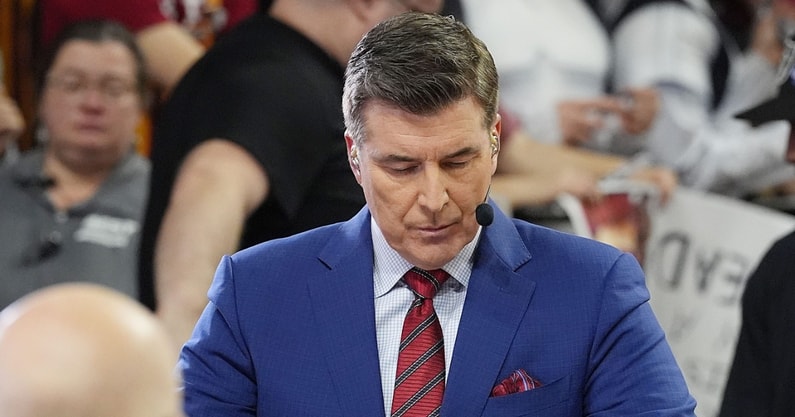Rece Davis suggests 'only answer' to stop college football tampering is collective bargaining

The future of college athletics still appears to be in question, even with the House settlement shaking up the sport. In particular, tampering remains an issue. It’s an issue that ESPN’s Rece Davis doesn’t believe can be corrected until athletes and schools go to collective bargaining.
This comes after a few years of growing concern from coaches and administrators about player movement created by NIL deals and the Transfer Portal. As it stands, it’s relatively easy for one school to tamper with another school’s player to get them into the portal, and there’s even now a lawsuit out from Wisconsin against Miami over those concerns.
“I think the only answer to this is collective bargaining,” Rece Davis said on the College GameDay Podcast. “Okay, if you’re going to collective bargain, almost by definition the players have to be employees, or else with whom are you going to bargain? Who’s going to represent each side?”
The new House settlement is hoping to change things in college sports for the better. It allows for revenue sharing, but that’s not all. NIL deals above $600 will need third-party approval and will be sent to a new clearinghouse called NIL Go. There is hope that settles the market down, but there’s no proof it will yet.
One thing the settlement won’t do is make athletes employees. They’re still classified as student-athletes. As long as that’s the case, Davis doesn’t think there is a legal way to control movement.
“I understand both sides of this,” Davis said. “But the biggest thing about the portal and the up in arms over that is if you’re not going to call them employees. If these are not going to be pay-for-play contracts, then what business do you have telling someone where they can go to school and where they can play?”
Top 10
- 1New
CFB Top 25
Predicting final 2025 rankings
- 2
July 4th commitments
Top recruit predictions
- 3
Heisman front-runners
Odds see shakeup
- 4Hot
National High School Rankings
Way Too Early Top 25
- 5Trending
10 fastest players in CFB
EA Sports reveals ranings
Get the On3 Top 10 to your inbox every morning
By clicking "Subscribe to Newsletter", I agree to On3's Privacy Notice, Terms, and use of my personal information described therein.
Money has driven plenty of transfers. This offseason, the NIL dispute between Nico Iamaleava and Tennessee became very public and led to his transfer. However, had he been under contract, that movement wouldn’t be possible in the same way. To get there, though, employee contracts and collective bargaining matter.
This comes as Wisconsin is suing Miami for tampering with a player, Xavier Lucas. Their argument is that he wouldn’t have transferred if Miami hadn’t broken tampering rules. The challenge, as Dan Wetzel explained on the College GameDay Podcast, it’s hard to say what value was actually lost and there’s no way to stop him from changing schools.
“NIL and being compensated for it, whether you want to call it pay-for-play or not does change that a little bit in my judgement in terms of building a framework in which guys can move around,” Davis said. “So that you don’t have unrestricted free agency throughout the calendar year all the time. So, I don’t know that there’s any way out of it besides this. I do think that Wisconsin is trying to draw a line in the sand and you’re probably right, the issue is with the player but it is a much better look to go after the institution that you’re upset with as opposed to going after the player.”
Making athletes employees and collectively bargaining with them would be a massive leap for the sport. There would almost certainly be other changes that come from it too. However, as Davis explained, it’s the best way to address tampering.